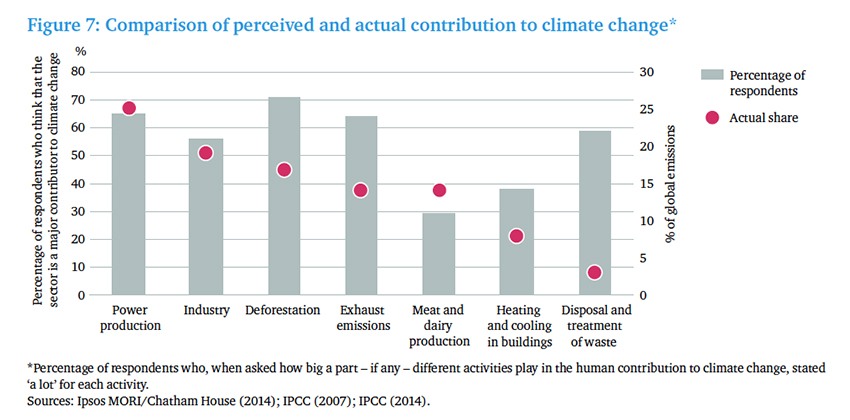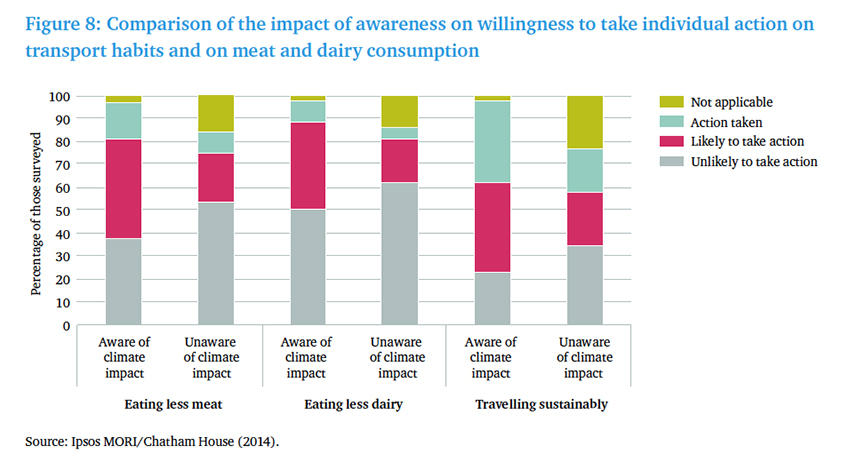“…[F]ood consumption has not been anchored in climate change policy to the same extent as energy production and usage…we address those issues by performing a relatively simple analysis that considers the extent to which one food exchange could contribute to achieving GHG reduction targets in the United States (US).”
They begin well enough, pointing out that reducing GHG emissions in meat production runs against any number of obstacles, including the biological limitations of what is fed and produced by cattle – so “livestock-related technical GHG mitigation” is limited to about a 10% reduction. To achieve consequential reductions, we need to eat less meat. To provide a simplified analysis, they compared the life-cycle GHG emissions of beef with that of beans. From the point of view of nutrition
- 1 kg of beef produces 40.2 kilograms of CO2 emissions while providing 3,320 calories and 144 grams of protein.
- 1 kg of beans produces 0.8 kilograms of CO2 emissions while delivering 3,410 calories and 216 grams of protein.
- Beans provide about 3% more calories and 33% more protein than a similar amount of beef.
We can consider them nutritionally “biosimilar,” although the nitpickers will point out that the proteins and calorie sources differ, as do the possible health consequences. Using that information, the researchers calculate the reduction in CO2 emissions from replacing all beef consumption with bean consumption. We will return to that assumption in a moment.
They point out that those baseline figures include N2O and CH4 emissions from feed, “enteric fermentation” (cow farts), manure management, and carbon emissions from the “slaughter process.” The studies they used did not include carbon emissions from farm machinery and soil – perhaps those bean numbers are a bit underestimated, but certainly not by a lot.
“Substituting beans for beef in the US diet would reduce CO2e emissions by 334 [million metric tons], accomplishing 75% of the 2020 reduction target…The results are almost identical when conserving either protein mass or energy.”
Quite an accomplishment if, and that is a very big if, it could be accomplished. Let’s leave aside the economic disruption to the roughly 900,000 people involved in US beef production [1] and concentrate on achieving that 100% conversion. The researchers are not stupid and freely admit that their calculations are an “upper-bound” value – the best we could achieve. So, the controlling assumption lies with how many of us are willing to give up our Porterhouse for pinto beans.
“…the resultant shifts—requiring societal level behavior change—are non-trivial and unprecedented at the national level. …While a national substitution of beans for beef would be socially demanding, a strong willingness to make dietary changes for environmental improvements, including eliminating red meat, has been demonstrated.”
They believe the "willingness" is strong. But let’s look at their citation from a think-tank, the Chatham House, in the UK. The Chatham house researchers surveyed a minimum of 1,000 citizens of 12 countries [2]. There were two interesting findings. First, we “know” less about the contributions of various factors to climate change than are correct. (That includes this author)
We underestimate power, meat, and dairy production while overestimating the contributions of industry, exhaust, deforestation, heating and cooling, and waste disposal. The more important finding is the graph showing how “strong” is our willingness to forsake meat.
The first two columns are the pertinent ones. The Chatham House group used this to illustrate that greater educational awareness resulted in more participants who took action (15%) and even more individuals who were “likely to take action” (44%). So exactly how many people will stop eating meat altogether? We don’t know; might we hazard a guess?
“Generally speaking, consumers prioritize factors with direct personal consequence when making food choices. Taste, price and considerations of food safety and health are more formative in shaping consumption decisions than factors with indirect societal consequence such as animal welfare or climate change.”
In a survey conducted for NPR in 2016, 51% of Americans ate meat once to four times a week, 38% five or more times. Between 2014 and 2019, our per capita consumption of beef increased by 7%. So I am forced to conclude that “likely” and “wanting” to take action is, as noted nutritionist Mary Poppins states, “A piecrust promise, easily made and easily broken.” We can count on the 10% of the American population that already has stopped eating meat to continue. But I find it hard to believe that we can eat our way out of global warming – our bias in favor of what is good today instead of what might be good tomorrow, especially if tomorrow is counted in years, is too strong. As another noted observer, Wimpy, said in 1932, 90 years ago, "I'll gladly pay you Tuesday for a hamburger today."
[1] Beef Cattle Production in the US
[2] Brazil, China, France, Germany, India, Italy, Japan, Poland, Russia, South Africa, the UK, and the US - Livestock – Climate Change’s Forgotten Sector Global Public Opinion on Meat and Dairy Consumption
Source: Substituting beans for beef as a contribution toward US climate change targets Climate Change DOI: 10.1007/s10584-017-1969-1






